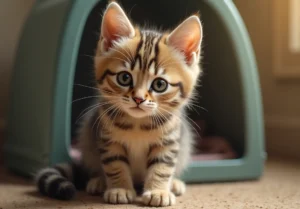Bengal cats, known for their striking appearance and playful nature, are a popular choice for many animal lovers. However, in some states in the US, owning a Bengal cat is illegal. So, why are Bengal cats illegal in some states in the US?
Breed-specific Legislation Explained
Bengal cats are banned in some states in the US due to breed-specific legislation (BSL). This type of law targets certain breeds or mixes of breeds that are perceived as dangerous or risky. Unfortunately, Bengal cats often fall into this category because of their wild ancestry and unique appearances.
State governments enact BSL to enhance public safety and reduce the risk of potential harm from certain breeds of cats. While the intentions behind BSL are to protect individuals and communities, it can be a controversial subject among pet owners and animal advocates.
In the case of Bengal cats, their hybrid genetics, which include Asian Leopard Cat lineage, can lead to behaviors that some perceive as unpredictable or aggressive. This misconception, combined with their striking coat patterns, can sometimes result in these cats being unfairly targeted by breed-specific legislation.
Concerns and Risks Associated with Bengal Cats
The decision to make Bengal cats illegal in some states stems from concerns over their behavior and potential risks they may pose to their owners and the community. These concerns typically revolve around space requirements, behavioral issues, and wild ancestry.
Space Requirements : Bengal cats are known for their energetic and playful nature, requiring ample space to roam and explore. In urban environments or small living spaces, they may feel confined and exhibit destructive behaviors.
Behavioral Issues : Due to their hybrid genetics, Bengal cats may inherit traits from their wild ancestors, leading to behaviors such as a strong prey drive, territorial tendencies, and a high activity level. Without proper training and enrichment, these behaviors can become problematic.
Wild Ancestry : The Asian Leopard Cat ancestry in Bengal cats can make them more challenging to care for compared to domesticated breeds. This wild lineage may contribute to a higher level of independence and, in some cases, aggression.
While these concerns are valid, it’s essential to note that not all Bengal cats exhibit these traits. Responsible ownership, early socialization, and proper training can help mitigate potential risks associated with Bengal cats, ensuring a harmonious relationship between these unique feline companions and their owners.
Controversy and Debate Surrounding Bengal Cats
Bengal cats, known for their distinctive coat patterns and playful personalities, have sparked controversy in some states across the US. The main reason behind the ban on Bengal cats in certain regions is their hybrid nature. Bengal cats are a cross between domestic cats and Asian leopard cats, resulting in a unique breed that some argue may pose a threat to local wildlife if let outdoors.
Supporters of the ban believe that allowing Bengal cats to roam freely could disrupt ecosystems and endanger native species. On the other hand, Bengal cat enthusiasts argue that proper containment and responsible ownership can mitigate these risks. They believe that with the right care and supervision, Bengal cats can coexist peacefully with other animals and wildlife.
It’s important to understand both perspectives and consider the potential impact of owning a Bengal cat in states where they are deemed illegal. Responsible pet ownership is key to addressing the concerns surrounding Bengal cats and finding a middle ground that ensures the well-being of both the cats and the environment they inhabit.
Alternative Options for Bengal Cat Lovers
For individuals residing in states where owning a Bengal cat is prohibited, there are still ways to stay connected to this beloved breed. Consider exploring the following alternative options:
Volunteer at Bengal Cat Rescues: Many rescue organizations specialize in Bengal cats and welcome volunteers to help care for and socialize these unique felines.
Attend Bengal Cat Shows: Attend Bengal cat shows and events to meet breeders, enthusiasts, and learn more about the breed without the need for ownership.
Become a Bengal Cat Foster Parent: Fostering Bengal cats through rescue organizations can provide temporary companionship and support for cats in need while adhering to local laws.
Join Bengal Cat Online Communities: Connect with other Bengal cat lovers online through forums, social media groups, and websites dedicated to the breed.
Advocate for Change: Get involved in local legislation efforts to promote responsible pet ownership and advocate for the legalization of Bengal cats in your state.
While owning a Bengal cat may not be possible in certain regions, there are still plenty of ways to engage with and support these remarkable cats within legal boundaries. Explore these alternative options to stay connected to the Bengal cat community and make a positive impact on feline welfare.
Legal Challenges and Advocacy Efforts
Bengal cat owners in certain states face legal challenges due to breed-specific bans aimed at regulating exotic pets. Advocacy groups like the International Bengal Cat Society work to overturn these laws through education and lobbying efforts, emphasizing responsible ownership and proper care for all cat breeds. By raising awareness about the unique qualities of Bengal cats and promoting positive interactions between owners and legislators, these advocacy groups strive to create a more inclusive environment for cat lovers across the country.
Impact on Bengal Cat Breeding and Adoption
Not being able to own Bengal cats in specific states directly impacts breeding and adoption practices within the cat community. Breeders may face limitations on where they can operate, leading to a decrease in the availability of Bengal kittens for interested adopters. Additionally, potential adopters in banned states may have to travel long distances to find a Bengal cat, increasing the financial and logistical burden of bringing one of these unique felines into their homes. This restriction ultimately hinders the overall growth and diversity of the Bengal cat population in the United States.
Key Consideration: When considering adopting a Bengal cat, be sure to check the laws and restrictions in your state to ensure compliance with regulations and avoid any legal issues down the road.
Importance of Responsible Pet Ownership
Responsible pet ownership is crucial when it comes to owning any pet, including Bengal cats. In states where Bengal cats are illegal, the main concern often revolves around potential risks to native wildlife, particularly due to the breed’s hybrid nature. By being a responsible pet owner, you can help address these concerns and promote the well-being of both your Bengal cat and the local ecosystem.
One key aspect of responsible pet ownership is ensuring that your Bengal cat is well-supervised outdoors. Always keep your cat contained in a secure area, such as a catio or enclosed outdoor space, to prevent them from hunting wildlife. Additionally, spaying or neutering your Bengal cat can help reduce the likelihood of them roaming and impacting the local environment.
Moreover, providing mental and physical stimulation for your Bengal cat is essential to prevent boredom and destructive behaviors. Engage in interactive playtime, provide scratching posts, and offer enrichment activities to keep your feline friend happy and healthy.
By demonstrating responsible pet ownership practices, you can help showcase the positive aspects of owning a Bengal cat and potentially contribute to changing regulations in states where they are currently illegal.
Fun Facts about Bengal Cats
- Bengal cats are known for their wild appearance, as they were bred to resemble small leopards.
- These charming cats often enjoy playing in water and have been known to splash around in a bathtub or even join their owners in the shower.
- Bengal cats have a unique coat pattern called “rosettes,” which are spots that resemble the markings of a wild leopard or jaguar.
- Despite their exotic looks, Bengal cats are known for their affectionate and social personalities, making them great companions for families and individuals alike.
- In addition to their striking appearance, Bengal cats are highly intelligent and can be trained to perform tricks and even walk on a leash.
Adding a Bengal cat to your family can bring a lot of joy and excitement, but it’s important to be aware of the legal restrictions in certain states. By learning about responsible pet ownership and the unique characteristics of Bengal cats, you can make informed decisions to ensure the well-being of your feline friend.
Alex, a passionate animal lover, has experience in training and understanding animal behavior. As a proud pet parent to two dogs and three cats, he founded AnimalReport.net to share insights from animal experts and expand his knowledge of the animal kingdom.




